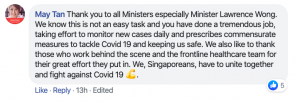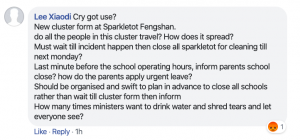Singapore—Speaking in Parliament on Wednesday (Mar 25), National Development Minister Lawrence Wong, who co-chairs the multi-ministry task force assigned to tackle the various issues stemming from the Covid-19 pandemic, could barely hold in his emotions as he endeavoured to express gratitude to those on the front lines who have staked their lives in fighting the spread of the disease.
Overcome with emotion, it took him several tries to get his words out, pausing a few times, and asking his fellow MPs to give him a moment, before he could finish this sentence: “Words are not sufficient to express our appreciation for the Singaporeans who are going all-out to fight the virus.”
He went on to say, “And I just want to say a big ‘Thank You’ to everyone who is doing their part.”
Mr Wong, who many have perceived to be performing well in his role as the co-chair of the task force, received warm words from many netizens who had seen him moved to tears, as clips of his speech in Parliament were shown online.
Netizens reiterated that the National Development Minister is “doing great.”

Many thanked him for his hard work in the past few weeks.





Netizen Tim Teo addressed his comment to fellow Singaporeans. “For people who have been bashing the committee with super negative comments, please spare a few minutes of your time to watch this video… appreciate the challenge and the difficulty of their job…this is not a time to politicize the issue.”

Some commented that Mr Wong’s tears show how human he is.


However, there are others who say that the Minister’s tears are simply “wayang,” implying that they are artificial, a mere show.





Worse yet, some said they could be a demonstration to gain votes, as the General Election is coming soon.

Some netizens brought up other issues


-/TISG
Read related: Lawrence Wong gets high marks from netizens for coronavirus crisis response
Lawrence Wong gets high marks from netizens for coronavirus crisis response

